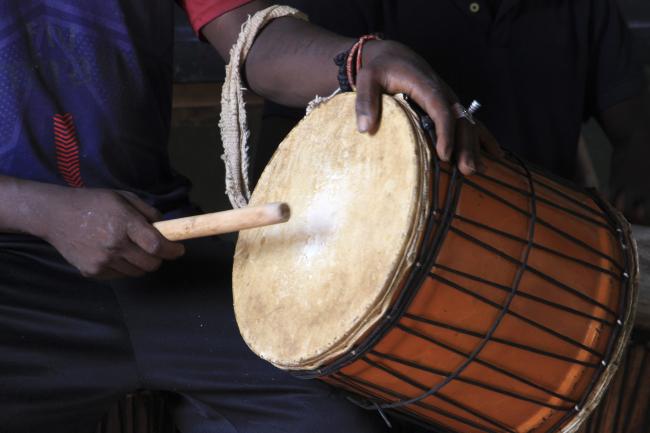Música
Jamale Abou Hamad - جمال أبو حمد | W Biit - وبقيت [Official Video]
To amplify the voices of the missing and honor their stories, our colleagues in Lebanon blended art, culture, and community engagement, Jamale Abou Hamad, a talented communications colleague, created a deeply moving song in tribute to these families. Inspired by her experiences and the stories of the families she has met, Jamale’s song is a heartfelt homage to the missing and their loved ones. It features a soulful dialogue between a wife and her missing husband, walking us through the cherished memories and promises that bind them. This work reflects the emotional weight of the issue and seeks to foster greater awareness and empathy, especially among the younger generation.
Rebeca Lane - Así te buscaré
Así te buscaré" es una canción para todos los desaparecidos del colectivo "Buscadoras Guanajuato". Letra de Fabrizio Lorusso.
Every night I dream of you
Todas las noches te vuelvo a soñar
Despite what they may say
Pese a lo que digan
I never stop waiting
No dejo de esperar
Tomorrow I will dream too, just like yesterday
También mañana soñaré,
Igual que ayer
That's how I will look for you (That's how I will look for you)
Así te buscaré (Así te buscaré)
Every night I dream of you
Todas las noches te vuelvo a soñar
Despite what they may say
Pese a lo que digan
I never stop waiting
No dejo de esperar
Tomorrow I will dream too, just like yesterday
También mañana soñaré, Igual que ayer
Sting - They Dance Alone (Bailan Solos)
Un homenaje a las "Madres de Plaza de Mayo", un grupo de mujeres argentinas que protestaron por la desaparición de sus hijos durante la Guerra Sucia en Argentina en los años 70 y 80.
Why are there women here dancing on their own?
¿Por qué hay mujeres aquí bailando solas?
Why is there this sadness in their eyes?
¿Por qué hay tristeza en sus ojos?
Why are the soldiers here?
¿Por qué están aquí los soldados?
Their faces fixed like stone?
Sus rostros inmóviles como piedra
I can't see what it is that they despise
No puedo ver a qué desprecian
They're dancing with the missing
Están bailando con los desaparecidos
They're dancing with the dead
Están bailando con los muertos
They dance with the invisible ones
Bailan con los invisibles
Their anguish is unsaid
Su angustia no se dice
They're dancing with their fathers
Bailan con sus padres
They're dancing with their sons
Bailan con sus hijos
They're dancing with their husbands
Bailan con sus esposos
They dance alone
They dance alone...
Bailan solas
Bailan solas...
Chantal Bitar - لا ضليت ولا فليت (NO TE QUEDASTE NI TE FUISTE)
Una canción del Comité de Familias de Secuestrados y Desaparecidos en Líbano, dedicada a todas las personas desaparecidas y desaparecidas forzosamente.
You didn’t stay nor did you leave -
No te quedaste ni te fuiste -
You didn’t stay nor did you leave
And your clothes are still at home
No te quedaste ni te fuiste
Y tu ropa todavía está en casa
Asking me about you everyday
Where on Earth did you disappear?
Preguntándome por ti todos los días
¿Dónde demonios desapareciste?
You didn’t stay nor did you leave
and your clothes are still at home
No te quedaste ni te fuiste
Y tu ropa todavía está en casa
Asking me about you every day
Where on earth did you disappear?
Preguntándome por ti todos los días
¿Dónde demonios desapareciste?
Your face, your voice, you’re fully here
They never fainted, never
Tu rostro, tu voz, están completamente aquí
Nunca se desvanecieron, nunca
And your beautiful laugh is on my mind
And in darkness, your eyes are the light…
Y tu hermosa risa está en mi mente
Y en la oscuridad, tus ojos son la luz...
PLAYING FOR CHANGE (TOCANDO PARA EL CAMBIO)
La organización PFC se asocia con el CICR en el Día Internacional de las Personas Desaparecidos.

PERÚ: BUENAS NOTICIAS PARA LOS FAMILIARES DESAPARECIDOS
Teófila, Roberta, Alberta, Fernandina, Matilde y Sofía perdieron a seres queridos a manos de la violencia armada que arrasó el distrito de Accomarca, en Ayacucho, en 1985.
A través de la danza, en seis videos cortos que mostraron en redes sociales, les dijeron a sus seres queridos desaparecidos todo lo que no habían podido decirles durante más de 30 años. Después de tanto tiempo, era mucho lo que tenían para decir.
Allin Willakuykuna - Buenas Noticias
El baile es una manera de expresar lo que no se puede transmitir con palabras. Así como lo han entendido los miembros de la Asociación Nacional de Familiares de Secuestrados, Detenidos y Desaparecidos del Perú (Anfasep). Se organizaron y realizaron un número artístico, concebido como un ritual que reinterpreta la celebración tradicional del Día de Muertos.
BUENAS NOTICIAS | Kayfex + SÖFY + Comité Internacional Cruz Roja + La Plaza y Sala de Parto
HIJAS Y NIETAS DE AYACUCHO (2024)
Buenas Noticias: Hijas y Nietas de Ayacucho, nueva versión del Proyecto homónimo, regresó a Huamanga para trabajar con jóvenes familiares y activistas de derechos humanos nacidos después de la violencia.
Trece jóvenes de Ayacucho, guiadas por el productor musical Kayfex y la directora de teatro Claudia Tangoa, han creado una canción titulada Buenas Noticias, que representa el sentir de la ausencia de sus seres queridos en sus familias y en su comunidad. A través de un canto de esperanza y resiliencia, las nuevas generaciones comunican las buenas noticias a sus seres queridos, hombres y mujeres a quienes continúan buscando.
La canción, escrita en quechua y español, es producida por Kayfex e interpretada por la cantante ayacuchana Söfy, en la voz principal, y las jóvenes participantes del proyecto, en los coros.


